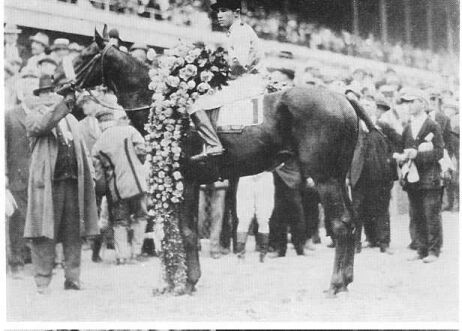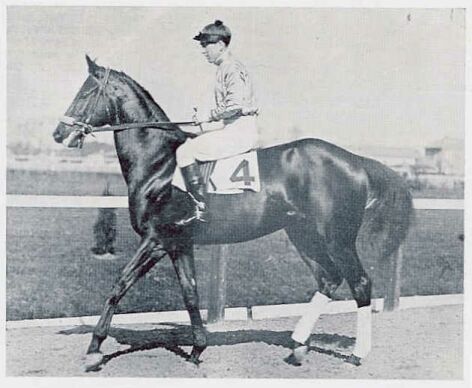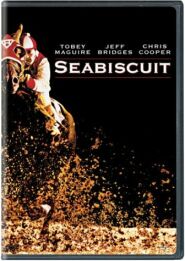

Those following racing in the neighborhood of New Orleans, Texas, and the Indian Territory in the early twentieth century all knew Al Hoots and his good mare U-See-it. She couldn't beat the remarkable Pan Zareta, but she beat everything else. The pair was banned from racing when Hoots refused to sell the mare after a claiming race. The horsemen had all agreed that U-see-it would not be claimed if Hoots ran her, and when someone failed to honor that agreement, Hoots defended his beloved mare with a shotgun.
On his deathbed, Al Hoots asked his wife to breed U-see-it to Black Toney, at the time one of the top sires in the country. He insisted that the resulting colt would win the Kentucky Derby, as he had foreseen in a dream. The stud fee was far beyond the means of Mrs. Hoots, but she agreed nonetheless. If it were at all possible, it would be done.
When oil was discovered in what is now Oklahoma, the Native Americans living there suddenly found themselves relieved of poverty. Dutifully, Mrs. Hoots sent her late husband's mare to Idle Hour Stock Farm in Kentucky.
This whole story sounds like it was dreamed up by Disney, and in fact the great children's writer Marguerite Henry used the resulting colt as the subject of a book.
Named Black Gold for the oil that had paid the stud fee, the son of U-see-it and Black Toney did indeed go to post in the Kentucky Derby. What's more, he did so in the fiftieth running, or golden anniversary, of the famous race. Hollywood could not have scripted it better, especially when Black Gold gained the lead in the last seventy yards and won.

Of course, a screenwriter would have made the horse an overwhelming longshot in the race, but Black Gold had given a good account of himself prior to the Derby and was in fact one of the favorites. He had won the Derby Trial, and the previous year he had won half of his eighteen races, including the Bashford Manor Stakes.
After the Kentucky Derby, Black Gold did not go on to the Preakness or the Belmont, and actually in 1924 the Triple Crown was still a couple years short of being so named. Instead, he became the first horse to win four different Derbies, including the Louisiana Derby, the Chicago Derby, and the Ohio State Derby.

His regular rider was Jaydee Mooney, who also groomed and exercised the colt. He rarely took other mounts, fearing that injury or suspension would keep him off his favorite. Hanley Webb, who had been a close friend of Al Hoots, was Black Gold's trainer.
When Black Gold was retired to stud, he suffered fertility problems and it was taken as a bad omen that the only colt he managed to sire was struck by lightning and killed, so he was sent back to the racetrack. Plagued with a quarter crack for the remainder of his career, Black Gold raced four more times without a win. Tragically, he broke down in the Salome Purse as a seven year old, and had to be destroyed. Black Gold was buried in the infield at the Fair Grounds, where he shares eternity with his mother's nemesis, Pan Zareta. He was elected into the Hall of Fame in 1989.
| Year | Starts | Wins | Seconds | Thirds | Earnings |
|---|---|---|---|---|---|
| Lifetime | 35 | 18 | 5 | 4 | $111,553 |
| Black Toney | Peter Pan | Commando | Domino |
| Emma C. | |||
| Cinderella | Hermit | ||
| Mazurka | |||
| Belgravia | Ben Brush | Bramble | |
| Roseville | |||
| Bonnie Gal | Galopin | ||
| Bonnie Doon | |||
| Useeit | Bonnie Joe | Faustus | Enquirer |
| Lizzy G. | |||
| Bonnie Rose | Bonnie Scotland | ||
| Melrose | |||
| Effie M. | Bowling Green | King Galop | |
| Playing Fields | |||
| Alma Glyn | Glyndon | ||
| Amelia Folsom |




This text protected by all applicable copyright laws. Do not duplicate or distribute without written permission. © Spiletta42.